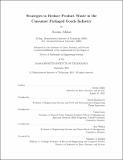Strategies to reduce product waste in the consumer packaged goods industry
Author(s)
Akkas, Arzum
DownloadFull printable version (3.296Mb)
Other Contributors
Massachusetts Institute of Technology. Engineering Systems Division.
Advisor
David Simchi-Levi.
Terms of use
Metadata
Show full item recordAbstract
The cost of waste for products such as soft drinks, shelf stable dry food, and dairy in the consumer packaged goods industry is massive, about $15 billion annually in the U.S.A. This thesis focuses on waste associated with product expiration since this type of waste involves both manufacturers and retailers as well as different functional areas such as production, warehousing, sales, procurement, and store operations. As a result, the industry has not made much progress in reducing this type of waste. We study three problems related to product expiration. Chapter 2 presents a descriptive study examining the root causes of product expiration and their impact on expiration. Using econometrics and our collaborator's data, we find that the amount of expiration can be reduced considerably via a case size reduction. We identify the next important opportunities in the areas of inventory aging in the manufacturer's supply chain and sales incentives, and thus the remainder of this thesis focuses on these two areas. Chapter 3 examines the manufacturer's sell-or-dispose decision for aged inventory. We develop an optimization model to find the minimum remaining shelf life below which the manufacturer does not sell the product since the cost of expiration is more than the sunk cost of production. We use machine learning to approximate optimum values which can be used as a low cost alternative method. If supply chain managers are held accountable for the cost of disposed items, they will have an incentive to better manage inventory. As a result, expiration will be reduced. Chapter 4 analyses sales-force compensation schemes from the perspective of product expiration caused by overselling. We develop a game theoretic model of the decision process of the manufacturer and the sales representative. We find a compensation scheme that aligns the interests of the manufacturer and the sales representative preventing overselling while achieving full profit potential for the manufacturer.
Description
Thesis: Ph. D. in Engineering Systems, Massachusetts Institute of Technology, School of Engineering, Institute for Data, Systems, and Society, 2015. This electronic version was submitted by the student author. The certified thesis is available in the Institute Archives and Special Collections. Cataloged from student-submitted PDF version of thesis. Includes bibliographical references (pages 165-169).
Date issued
2015Department
Massachusetts Institute of Technology. Engineering Systems Division; Massachusetts Institute of Technology. Institute for Data, Systems, and SocietyPublisher
Massachusetts Institute of Technology
Keywords
Institute for Data, Systems, and Society., Engineering Systems Division.